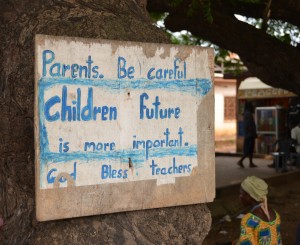Transparency International’s Advocacy and Legal Advice Centres provide free assistance to victims and witnesses of corruption, helping them to pursue their complaints. They process thousands of cases each year in more than 40 countries. This is one of them.
 Ghana has made big efforts to improve access to primary education. Primary school fees were abolished in 2005, substantially boosting enrolment rates and literacy levels among young Ghanaians. The relatively steep cost of higher education, however, remains an obstacle to equal opportunities. A case brought to Transparency International (TI) Ghana showed that some students at a polytechnic were being put at even greater disadvantage.
Ghana has made big efforts to improve access to primary education. Primary school fees were abolished in 2005, substantially boosting enrolment rates and literacy levels among young Ghanaians. The relatively steep cost of higher education, however, remains an obstacle to equal opportunities. A case brought to Transparency International (TI) Ghana showed that some students at a polytechnic were being put at even greater disadvantage.
Kofi* alleged in statements to TI Ghana that he and his fellow students had been asked by their lecturers to pay a supplementary charge for class hand-outs. As a “reward” they were reportedly promised an additional 20 per cent in their end of year grade. Many poorer students could simply not afford the cost, and they were faced with competing on an unequal basis with their better-off counterparts.
30% of Ghanaians live on less than US$1.25 per day
TI Ghana petitioned the authorities to address the issue. The school board conducted an internal investigation, and the accused staff members confessed. The school then resolved to make all school materials available for free or at affordable prices. TI Ghana hopes that Kofi’s case will promote similar changes throughout Ghana, where extorting students is believed to be widespread.
*Names have been changed.
Our centres have processed hundreds of cases related to corruption in the education sector. In Ghana 16% of cases are about corruption in the education sector.
Read more stories from the centres here.















 Connect with us on Facebook
Connect with us on Facebook Follow us on Twitter
Follow us on Twitter